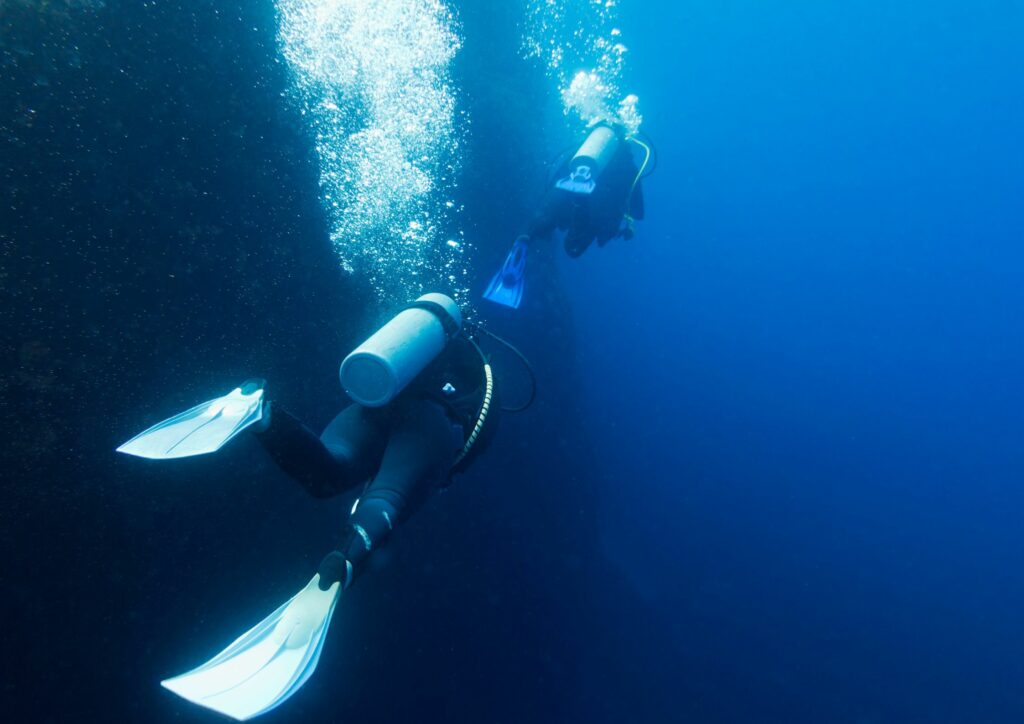Embarking on your journey to achieve Advanced Open Water certification in the stunning underwater landscapes of Bali is an exhilarating endeavor. This tropical paradise offers an abundance of opportunities to enhance your diving skills, particularly through engaging in a minimum of five dives for each specialty, such as deep diving, night diving, buoyancy control, and navigation. As you explore Bali’s vibrant reefs and tranquil ocean depths, you’ll not only sharpen your technical abilities but also deepen your appreciation for the rich marine life that calls these waters home. Let’s dive into the essential tips and insights that will guide you through the process of mastering the waves and acing your Advanced Open Water course in Bali.
Understanding the Advanced Open Water Certification
The Advanced Open Water Certification is a crucial step for scuba divers looking to enhance their skills and explore new underwater environments. In Bali, this certification typically requires a minimum of five dives dedicated to various specialties, including deep diving, night diving, buoyancy control, and navigation. Each specialty dive not only builds confidence but also allows divers to experience the vibrant underwater life that Bali offers. This certification helps divers improve their overall diving technique and safety standards, providing the necessary knowledge for more challenging dive sites. As you prepare for this certification, ensure you choose a reputable dive center that provides thorough training and guidance tailored to Bali’s unique diving conditions.
Essential Requirements: Minimum 5 Dives for Each Specialty
To successfully pass the Advanced Open Water course in Bali, divers must complete a minimum of five dives for each specialty. This includes crucial skills such as deep diving, night diving, buoyancy control, and navigation. Each specialty dive is designed to enhance your underwater abilities and boost your confidence in various conditions. Mastering buoyancy control is particularly essential, as it allows divers to navigate effortlessly through the vibrant marine life surrounding Bali’s reefs. Additionally, night diving offers a unique perspective of the underwater world, introducing divers to nocturnal marine activities. Completing these dives not only fulfills course requirements but also immerses participants in the stunning underwater scenery of Bali.
The Thrill of Deep Diving: Techniques and Safety

Deep diving is one of the most exhilarating aspects of the Advanced Open Water course in Bali. To successfully navigate this deep blue experience, divers should focus on buoyancy control—a skill crucial for maintaining stability underwater. Practicing through controlled descents and ascents helps mitigate the risks associated with deeper dives. Additionally, it’s essential to understand the importance of safety stops, allowing your body to safely off-gas nitrogen. Being familiar with your dive computer and its functions will help monitor depth and time. Remember, deep diving offers breathtaking sights, but adhering to safety protocols ensures a delightful and secure underwater adventure.
Exploring the Night: Preparation for Night Diving
Preparing for night diving is essential for your success in the Advanced Open Water course in Bali. Ensure you are equipped with reliable dive lights and a backup light to navigate the underwater world after sunset. Familiarize yourself with the dive site during the day to identify entry points, potential hazards, and marine life hotspots. Practice buoyancy control and navigation skills in daylight before venturing into the dark depths. Additionally, communicate with your dive buddy about your plans and safety procedures to ensure a smooth experience. Remember, night diving opens up a mesmerizing world of bioluminescent creatures and nocturnal marine life just waiting to be explored.
Perfecting Buoyancy Control: Tips for Divers
Perfecting buoyancy control is essential for any diver, especially those pursuing their Advanced Open Water certification in Bali. Achieving neutral buoyancy allows divers to glide effortlessly through the water, minimizing their impact on marine life and enhancing their overall diving experience. To improve buoyancy control, practice the use of your lungs for fine-tuning buoyancy changes, adjusting your weights accordingly, and maintaining a steady breathing pattern. Frequent practice during your dives will also help you get accustomed to the underwater environment. Remember, with a minimum of five dives for each specialty, including deep diving and navigation, you’ll have ample opportunity to hone this crucial skill and enjoy the stunning underwater landscapes of Bali.
Mastering Navigation Underwater: Tools and Techniques
Mastering navigation underwater is essential for any advanced diver and particularly crucial for those tackling the Open Water certification in Bali. Divers need to familiarize themselves with tools such as compasses and natural navigation techniques, which can guide them in underwater exploration. Practice is vital; using a compass to plot a course between landmarks helps improve confidence in navigation skills. Additionally, divers should study their surroundings, such as reef formations, currents, and unique natural markers. Remember to conduct at least five dives focusing on navigation as part of your training, as this will not only enhance your skills but also ensure unforgettable underwater experiences during your adventures in Bali.
Selecting the Best Dive Sites in Bali for Advanced Training
Selecting the right dive sites in Bali is crucial for a successful Advanced Open Water certification. Known for its vibrant marine life and diverse underwater landscapes, Bali offers an array of options to meet the requirements, including deep diving, night diving, and buoyancy control. Sites like Tulamben, famous for the USAT Liberty wreck, provide an excellent opportunity for deep dives, while Nusa Penida showcases stunning coral reefs perfect for navigation practice. Don’t forget about the magical night dive experiences at Amed that reveal the nightlife of the ocean. To ensure mastery, aim for a minimum of five dives for each specialty across these captivating locations.
Common Challenges and Solutions in Advanced Open Water Diving
Advanced Open Water diving presents unique challenges, especially in a vibrant destination like Bali. One common difficulty is mastering buoyancy control; achieving this requires practice and focus during each dive session. To overcome this, divers can engage in buoyancy training exercises prior to their dives. Another challenge is navigation, where divers must accurately use their compass and environmental cues to avoid getting lost. Joining a guided dive can help build confidence in navigation skills. Additionally, deep diving and night diving present their own set of concerns, such as pressure and visibility. Proper education and practice can equip divers with the skills they need to tackle these challenges successfully.
Dive Into Success: Your Path to Advanced Open Water Certification
Successfully completing your Advanced Open Water certification in Bali is not just about meeting the minimum requirement of five dives for each specialty; it’s about immersing yourself in the stunning underwater world while enhancing your skills in deep diving, night diving, buoyancy control, and navigation. As you explore Bali’s vibrant reefs and tranquil waters, remember that every Bali diving is an opportunity to learn and grow. Embrace each specialty wholeheartedly, as they not only build your confidence but also enrich your overall diving experience.
With the right preparation, commitment, and passion, you’ll be well on your way to becoming a more accomplished diver. As you embark on this adventure, take note of the unique challenges and rewards presented by each dive specialty. Emphasizing buoyancy control, refining your navigation skills, and experiencing the wonder of night diving will contribute significantly to your diving prowess. Bali, with its breathtaking marine life and captivating underwater landscapes, serves as the perfect backdrop for your journey. Remember that every dive you take gets you closer to mastery, so dive in with enthusiasm, and you will surely excel in your Advanced Open Water certification.

I’m so excited to start my Advanced Open Water certification journey in Bali! I’ve always been fascinated by the underwater world, and this course will help me improve my skills and explore new depths.
Hi Ling Ling Tan, Congratulations on taking the first step towards your Advanced Open Water certification journey in Bali! It’s indeed an exciting experience that will help you improve your diving skills and explore the underwater world. With our expertise and guidance, you’ll be able to master deep diving, night diving, buoyancy control, and navigation. Don’t hesitate to reach out if you have any questions or concerns. We’re here to support you throughout your journey. By the way, would you like to know more about the best dive sites in Bali for Advanced Open Water training? Contact us at Tel: +65 6734 9373 or Email: [email protected].
I love how this article highlights the importance of buoyancy control and navigation skills. As a beginner, I’m looking forward to practicing these skills in Bali’s stunning dive sites.
Hi Khai Wei Lim, thank you for sharing your enthusiasm about practicing buoyancy control and navigation skills in Bali’s stunning dive sites. At Gill Divers, we understand the importance of mastering these skills to enhance your diving experience. As a beginner, it’s great that you’re committed to improving your techniques. Remember to take your time, stay relaxed, and focus on small adjustments to achieve neutral buoyancy. For navigation, practice using your compass and natural cues like reef formations and currents. Don’t hesitate to reach out if you have any questions or need guidance. We’re here to help! Tel: +65 6734 9373, Email: [email protected]
I’ve heard great things about the night diving experiences in Amed. Can’t wait to explore the magical world of bioluminescent creatures and nocturnal marine life!
That’s great to hear! Night diving in Amed is indeed an unforgettable experience, with the bioluminescent creatures and nocturnal marine life creating a mesmerizing display. As you embark on your night diving adventure, remember to focus on buoyancy control and navigation skills to ensure a safe and enjoyable dive. And don’t forget to communicate with your dive buddy about your plans and safety procedures. We’re confident that you’ll have an amazing time exploring the underwater world in Bali! If you have any questions or need further guidance, feel free to reach out to us at Tel: +65 6734 9373, Email: [email protected].